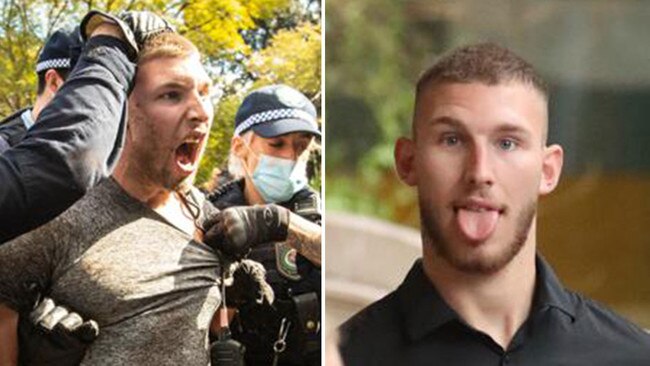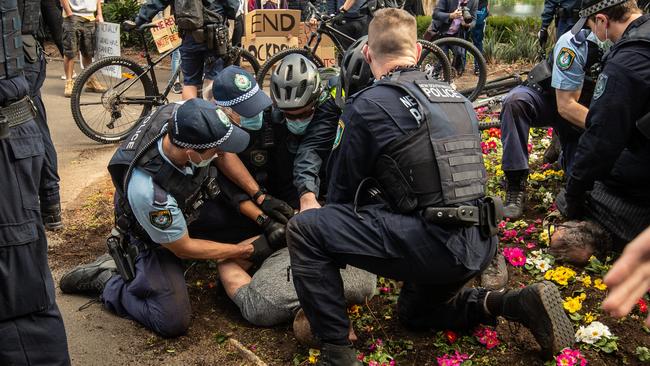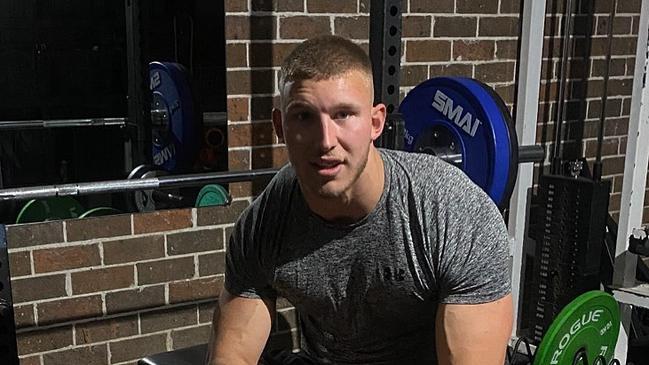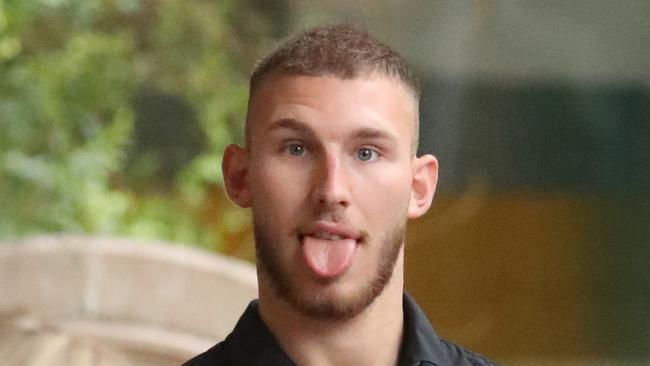Nikola Dedovic sentenced over Chippendale anti-lockdown protest
It was the photo that defied a nation in the grip of one of the deadliest pandemics in living memory. Now, the aspiring boxer featured in the famous image has had his day in court.

Police & Courts
Don't miss out on the headlines from Police & Courts. Followed categories will be added to My News.
EXCLUSIVE: An aspiring boxer — whose own lawyer dubbed him the “poster boy for the biggest idiot in Australia” after his arrest at an anti-Covid lockdown rally was splashed across the front page of The Sunday Telegraph — has had his day in court for his defiant behaviour.
Nikola Dedovic was one of thousands who descended on Victoria Park in Chippendale on July 24 last year to take part in the unauthorised ‘Rally for Freedom’ march at the height of Sydney’s Covid lockdown period.
Public health orders at that time prohibited more than two people congregating in a public place.
The Wollongong man, 21, fronted Downing Centre Local Court on Monday where he entered a guilty plea to a charge of resisting police after previously pleading guilty to defying public health orders.
The pleas led to police withdrawing a further charge of assaulting police.
Court documents detailed how Dedovic was involved in an altercation with an officer at the height of the march before darting back into the hoard of protesters to avoid being arrested.
The police formed a line to prevent the protesters from leaving Victoria Park, at which point Dedovic sprinted at them to try and burst through the human barrier, the court heard.
Dedovic was tackled to the ground, but he tensed his arms and tried to fight off three officers who were struggling to handcuff him.
A short time later, the officers were able to subdue Dedovic who was arrested and taken to Surry Hills Police Station.

In court on Monday, Dedovic‘s lawyer Martin Zanolla said his client had been subjected to “extra-curial punishment” from the media, citing what he described as the “fairly spectacular” photo on the front page of The Sunday Telegraph.
Mr Zanolla said the image of Dedovic became associated with another widely-published photo from an associated rally in Melbourne on the same day.
“That day there was a horse punching incident in Melbourne,” Mr Zanolla said.
“His picture and his name were attached to articles of that incident.”
Magistrate Gareth Christofi responded “it’s unfortunate isn’t it, it’s an unfortunate consequence of going to an unauthorised rally and conducting himself in the way that he did”.
Dedovic made no formal apology in court for attending the rally, however, Mr Zanolla told the court his client was no longer involved with people who held those “fringe views”.
Mr Zanolla said Dedovic began working the Port Kembla Steelworks after his pressure cleaning start-up business went bust during the pandemic.
He said his client was an up-and-coming boxer who was required to be a “person of good character” in order to be registered.
“There must be plenty of good boxers who can’t box depending on how strict the character test is,” the magistrate quipped.

The court heard Dedovic was the victim of an “unrelated and unprovoked one-punch attack” in Wollongong 10 weeks ago which rendered him unable to compete, however, he was planning to be back in the ring for “future events”.
“One would hope the media attention he had received wouldn’t hamper that,” Mr Zanolla said before asking Mr Christofi to consider not recording a conviction which could curtail his prospects of competing overseas.

The magistrate said not recording a conviction “wouldn’t be possible” before asking if Dedovic had a title he went by when he boxed.
“Boxers tend to have a stage name,” Mr Christofi said.
“Anthony ‘The Man’ Mundine for example. He could have something to do with the steelworks like Nikola ‘Man of Steel’ Dedovic.”
“I am not too sure about that,” a surprised Mr Zanolla responded.
Mr Christofi said Dedovic had made a “spectacle” of himself at the rally and convicted him of both charges. Dedovic was fined a total of $1500 for both offences.
“During the hearing I saw some video footage showing [Dedovic] making it as difficult as possible for police to make an arrest,” he said.
“To put this in context, this occurred when the country was concerned about the disease and its spread.
“Many people were dying and becoming seriously ill and there was a great strain on hospitals.
“Police were placing themselves at risk of catching the disease which could have been fatal – this was a serious example of resisting arrest.”





